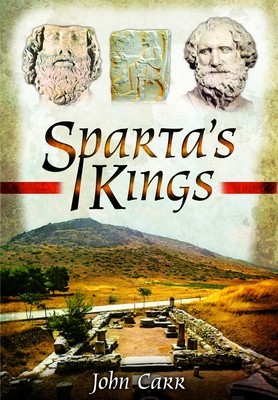
- We will send in 10–14 business days.
- Author: John Car
- Publisher: Pen & Sword Military
- ISBN-10: 1036150267
- ISBN-13: 9781036150266
- Format: 15.8 x 23.6 x 2.6 cm, minkšti viršeliai
- Language: English
- SAVE -10% with code: EXTRA
Reviews
Description
In ancient Greece, Sparta was unique in having a dual kingship two kings from different clans, the Agiads and the Eurypontids, reigning simultaneously. The institution was already well-developed by the 8th century BC, when Theopompos of the Eurypontid clan emerges as the first recorded Spartan king. At least fifty-seven men held office as Spartan king between Theopompos and the Agiad Kleomenes III who died in 222 BC. For almost all this period the Spartan kingship was primarily a military office, and thus the kings embody much of the military history of Sparta.
Wherever Spartas main battles took place, there the kings were. Naturally, the character of the particular king would often determine the outcome of a battle or campaign. Leonidas I at Thermopylai was one example. At the other end of the scale the young and unwarlike Pleistoanax twice declined an encounter with the Athenians when sent against that city. John Carr offers a chronological account of the kings and their accomplishments (or lack thereof), from the founding Herakleidai clan to Kleomenes III and his successor, the dictator Nabis, and the Roman conquest in the middle of the 2nd century BC. The book is not intended to be a complete history of Sparta. It will be a human interest and war story, focusing attention on the kings personal qualities as well as their (or their generals) military accomplishments and, where applicable, their politics as well.
EXTRA 10 % discount with code: EXTRA
The promotion ends in 23d.19:06:03
The discount code is valid when purchasing from 10 €. Discounts do not stack.
- Author: John Car
- Publisher: Pen & Sword Military
- ISBN-10: 1036150267
- ISBN-13: 9781036150266
- Format: 15.8 x 23.6 x 2.6 cm, minkšti viršeliai
- Language: English English
In ancient Greece, Sparta was unique in having a dual kingship two kings from different clans, the Agiads and the Eurypontids, reigning simultaneously. The institution was already well-developed by the 8th century BC, when Theopompos of the Eurypontid clan emerges as the first recorded Spartan king. At least fifty-seven men held office as Spartan king between Theopompos and the Agiad Kleomenes III who died in 222 BC. For almost all this period the Spartan kingship was primarily a military office, and thus the kings embody much of the military history of Sparta.
Wherever Spartas main battles took place, there the kings were. Naturally, the character of the particular king would often determine the outcome of a battle or campaign. Leonidas I at Thermopylai was one example. At the other end of the scale the young and unwarlike Pleistoanax twice declined an encounter with the Athenians when sent against that city. John Carr offers a chronological account of the kings and their accomplishments (or lack thereof), from the founding Herakleidai clan to Kleomenes III and his successor, the dictator Nabis, and the Roman conquest in the middle of the 2nd century BC. The book is not intended to be a complete history of Sparta. It will be a human interest and war story, focusing attention on the kings personal qualities as well as their (or their generals) military accomplishments and, where applicable, their politics as well.


Reviews